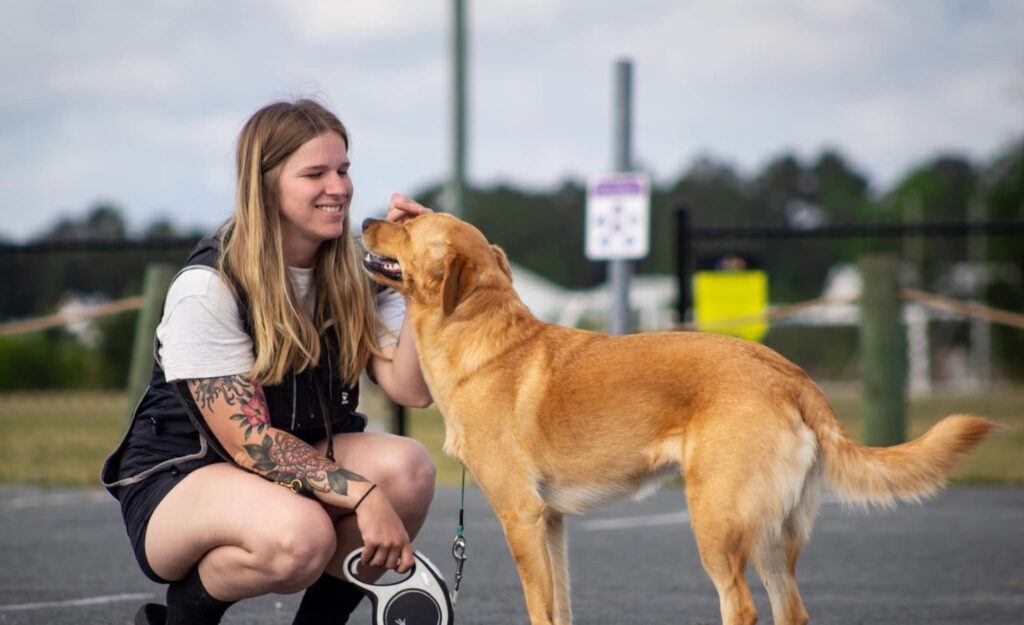Training your dog isn’t just about teaching them to sit or stay. It’s a transformative process that shapes their behavior, ensures their safety, and strengthens the bond between you and your furry companion. Professional dog training is a powerful investment that provides long-lasting benefits. Skilled dog trainers bring years of knowledge, an understanding of dog psychology, and practical experience to help address any issues your dog may face.
This article explores why professional dog training is so crucial by diving deep into three main areas: knowledge and experience, safety, and the financial investment required.
1. Knowledge and Experience: Why Professional Trainers Make a Difference
Extensive Experience in Dog Behavior
Professional dog trainers are experts in the field, with years of experience working with a wide range of dogs. They have observed and addressed every type of canine behavior, from basic obedience challenges to more severe behavioral issues like aggression or anxiety.
This extensive hands-on experience equips trainers to understand the nuances of each dog’s behavior, allowing them to tailor their approach effectively.
Understanding Canine Psychology
An expert dog trainer doesn’t just teach commands—they understand the science of dog behavior. Dogs, like humans, have emotions, instincts, and unique personalities. Professional dog trainers know how to read body language, interpret signals, and recognize triggers that influence your dog’s behavior.
This expertise allows trainers to pinpoint the root cause of issues such as excessive barking, separation anxiety, or leash pulling. Rather than applying generic solutions, they create a plan that directly addresses the specific behavior, ensuring more effective results in less time.
Customizing Dog Training Plans for Your Dog’s Needs
Each dog is different, and so are their training needs. Professional dog trainers create personalized dog training programs tailored to your dog’s temperament, breed, and behavioral challenges. To learn more about choosing the right dog training program, visit our blog for helpful guidelines.
Socialization: Preparing Your Dog for the World
Without proper socialization, dogs may become fearful, anxious, or even aggressive in unfamiliar environments or around other people and pets. Professional dog trainers help dogs develop proper socialization skills by exposing them to various people, animals, and environments in a safe, controlled manner.
Invest in your dog’s future today
2. Safety: Ensuring Your Dog’s Protection
Life-Saving Commands
The safety of your dog and those around them is one of the primary reasons to invest in professional dog training. Simple commands like “come,” “stay,” “leave it,” and “drop it” can prevent accidents and even save your dog’s life.
For example, if your dog is about to run into traffic, a well-timed “stay” command can stop them in their tracks. Similarly, “leave it” can prevent your dog from picking up dangerous objects or ingesting harmful substances.
Preventing Dangerous Situations
Proper dog training doesn’t just address behavioral issues—it also equips your dog with the skills to avoid potentially dangerous situations. Dogs that aren’t trained may dart into traffic, pick up toxic foods, or get into fights with other animals. By teaching your dog obedience and control, you reduce the likelihood of such incidents.
For example, a trained dog is less likely to react aggressively to a strange person or animal, which is key in preventing dangerous confrontations.
Socialization to Combat Fear and Aggression
Fear and aggression are common behavioral problems that can pose safety risks. If a dog is scared or feels threatened, they might act out aggressively to protect themselves. Professional dog trainers help dogs overcome fear by exposing them to controlled situations where they can learn to relax and respond appropriately.
Confidence Building: Reducing Fear-Based Reactions
A lack of confidence can lead to a dog reacting out of fear. Through structured training, dogs build confidence in themselves and their environment. This confidence makes them less likely to react impulsively out of fear, resulting in a calmer, more balanced dog.
Boundary Training for Safety
One of the most critical safety aspects is boundary training. Many accidents happen when dogs run out of open doors or gates. Boundary training teaches dogs to understand their limits, preventing them from running into unsafe situations like roads or unknown areas.
Ensure your dog’s safety with expert dog training. Book Your Free Consultation Today
3. Financial Investment: The Value of Professional Dog Training
Long-Term Savings Through Behavior Correction
At first glance, professional dog training can seem like a significant expense, but the benefits far outweigh the costs. Well-trained dogs are less likely to engage in destructive behaviors, such as chewing furniture, digging up gardens, or tearing up shoes. Over time, these behaviors can lead to expensive repairs or replacement costs.
Additionally, proper training can prevent health issues caused by the ingestion of harmful objects, saving you money on potential vet bills.
Enjoying More Adventures Together
A professionally trained dog is easier to take on adventures. Whether you enjoy hiking, going to dog-friendly restaurants, or shopping, a well-behaved dog will be more enjoyable to have around. When your dog is obedient and responsive to commands, you’re free to engage in more activities without worrying about how they’ll behave.
Enhance quality of life and create a stronger bond with your dog today.
Avoiding Legal Troubles Due to Aggression
One of the risks associated with untrained dogs is aggressive behavior, which can lead to legal troubles. In many places, if a dog bites someone, the owner could face fines, lawsuits, or worse.
Strengthening the Human-Dog Bond
The relationship between you and your dog is built on trust and understanding. Professional dog training facilitates this by teaching you how to communicate effectively with your dog.
Lifelong Benefits: Maintaining Progress
Training doesn’t stop once the professional sessions are over. A good trainer will not only teach your dog the necessary skills but will also provide you with the tools to maintain those skills over time. By reinforcing positive behaviors at home, your dog continues to thrive well into the future.
The Long-Term Value of Professional Dog Training
Professional dog training is an investment that yields immeasurable returns in terms of safety, behavior, and the overall well-being of both you and your dog. It helps your dog become well-mannered, confident, and safe in any situation, while also preventing potential accidents or legal issues. The long-term benefits of a professionally trained dog—such as improved communication, better behavior, and a stronger bond—make the initial financial investment more than worthwhile. By working with an experienced dog trainer, you’re setting the stage for a lifetime of happy, healthy, and harmonious companionship with your furry friend.
For professional dog training in Wilmington, NC and surrounding areas, contact AvidDog Dog Training today.
FAQs
1. How long does it take for a dog to be fully trained?
The length of time it takes for a dog to be fully trained depends on the dog’s age, temperament, and the behaviors being addressed. On average, it can take anywhere from a few weeks to several months for significant progress.
2. Can professional dog training help with aggressive behavior?
Yes, professional dog trainers use proven techniques to manage and reduce aggressive behaviors. Through positive reinforcement and behavior modification, aggression can be effectively managed.
3. What are the basic commands every dog should learn?
Essential commands include “sit,” “stay,” “come,” “leave it,” and “drop it.” These commands are crucial for both safety and good behavior.
4. Is professional dog training really worth the cost?
Absolutely! The benefits of professional dog training, including a well-behaved, safe dog and a stronger bond between you and your pet, far outweigh the initial investment.
5. Can I continue training my dog after the professional sessions are over?
Yes, a good trainer will teach you how to continue reinforcing behaviors at home. With consistent practice, you can ensure your dog’s progress is maintained long-term.
Jenny Klamm, owner of AvidDog Dog Training, has been professionally providing dog training in Wilmington, NC, and surrounding areas since 2017. Passionate about ethical and effective training, she specializes in rehabilitating dogs with aggression, anxiety, and reactivity. Jenny helps dog owners build trusting bonds with their pets through compassionate training. Book your free consultation today! https://aviddogtraining.com/contact-us/.




